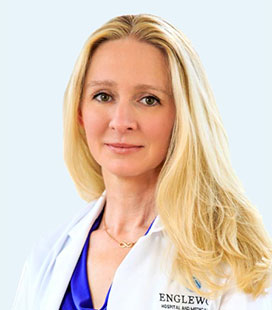
Anna Serur, MD, is chief of colon and rectal surgery at Englewood Health
What’s the difference between Crohn’s disease, ulcerative colitis, and diverticulitis?
Dr. Serur: Crohn’s disease is an inflammatory disease that can affect anywhere in the intestinal tract, from end to end. Crohn’s patients have periods of active disease, or flare-ups, when they experience signs and symptoms, and periods of remission, when the signs and symptoms cease. Ulcerative colitis is an inflammatory disease that causes long-term inflammation and ulcers (sores) contained to the lining of the colon. Signs and symptoms develop over time, rather than suddenly. Diverticulitis is an inflammation or infection of small pouches that form along the intestinal wall. These pouches most commonly develop in the sigmoid colon and can cause acute or chronic signs and symptoms.What signs and symptoms should I watch for?
Dr. Serur: For Crohn’s disease and ulcerative colitis, symptoms can include intense abdominal pain, severe chronic diarrhea, weight loss, malnutrition, and fatigue. Both conditions can be very debilitating and lead to life-threatening complications such as severe bleeding, perforation of the colon, severe dehydration, and rapid swelling of the colon. The most common signs and symptoms of diverticulitis are severe abdominal pain and fever.How are these diseases treated?
Dr. Serur: There are many successful, well-tolerated medications used to treat Crohn’s disease and ulcerative colitis. In cases where medical treatment and lifestyle modifications are not effective enough at controlling the disease, surgery may be necessary. Over the past 10 years, diverticulitis treatment protocols have evolved. Surgery is recommended for some patients experiencing attacks or complications. The good news is we know a lot more about these diseases today than we did even five years ago. As a result, treatments are becoming more individualized.Is there anything I can do to prevent these illnesses?
Dr. Serur: Unfortunately there is no way to prevent Crohn’s disease or ulcerative colitis. But better nutrition, lifestyle changes, and smoking cessation for those who smoke can help alleviate symptoms. Eating a high-fiber diet, drinking plenty of fluids, and getting sufficient exercise may help to prevent diverticulitis. Because stress can bring on flare-ups of all three conditions, it is vital that patients develop a stress management routine. Exercise is particularly helpful—go to the gym, do Pilates or yoga. While these conditions are complex, they are compatible with a normal lifestyle. Under a physician’s care, patients should not be afraid to go on with their lives. Posted March 2019
Anna Serur, MD, is chief of colon and rectal surgery at Englewood Health
